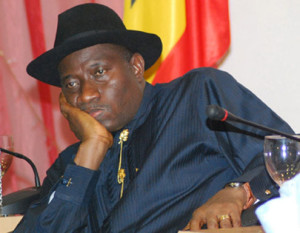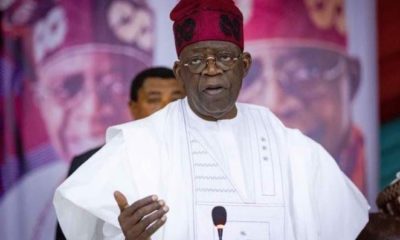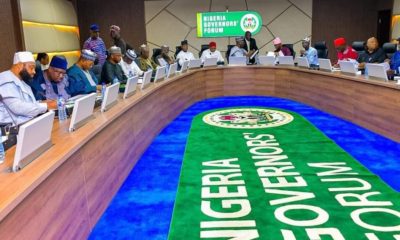Finance
$20bn oil money reunites Nigeria’s Governors against Jonathan’s Govt

ABUJA—NIGERIA’S 35 governors, cutting across different political divides yesterday, put aside the two-year feud that has factionalised their umbrella body, Nigeria Governors Forum, NGF, to demand an account of the estimated $20 billion they claimed accrued to the Excess Crude Account, ECA, while the NGF crisis lasted.
The demand which was directed at outgoing President Jonathan’s Minister for
Finance, Dr. Ngozi Okonjo-Iweala, was immediately rebuffed by the minister, who asked the governors to seek clarification from their finance commissioners. Reflective of their new unity, the governors by consensus, adopted Governor Abdulaziz Yari of Zamfara State as the new chairman of the NGF to take over from Governor Rotimi Amaechi, who presided at the session.
Governor Jonah Jang of Plateau State, who had claimed chairman of the other faction of the NGF, was absent at the meeting that was, however, attended by several members of his faction. Rising from the meeting which commenced late on Monday and ended in the wee hours of yesterday, the governors urged the minister to explain the circumstances surrounding the money that accrued to the ECA between June 2013 and April 2015.
Reading a communiqué at the end of the meeting which started 9 pm and ended 1am, the outgoing chairman, Governor Amaechi announced that Governor Yari was adopted as chairman of the body to serve for one year from May 2015 to May 2016.
The meeting which took place at the Lagos/ Osun Hall of Transcorp Hilton, Abuja, also approved the establishment of a Governors’ Forum Academy to be tagged the NGF Leadership Academy that would be responsible for capacity building of governors and other officials holding public office and to be overseen by the secretariat of NGF. According to the governors, there would be an induction course for new and returning governors in June, 2015 aimed at equipping them with knowledge of global best practices in the running of their offices.
The governors, who congratulated the President-Elect, Muhammadu Buhari on his election also hailed President Goodluck Jonathan for his statesmanship in accepting the outcome of the elections. The communiqué read thus: “We are hereby reconciled and reunited as a single umbrella association of the 36 state governors of Nigeria regardless of party or region.
“Forum congratulates the President-elect, Muhammadu Buhari on his victory in the recent presidential election which held on March 28, 2015 and President Goodluck Jonathan for his statesmanship in accepting the outcome of the elections.
“In light of the fact that funds in the Excess Crude were disbursed in May 2013, there is need for the Minister of Finance and Coordinating Minister of the Economy, Dr. Ngozi Okonjo-Iweala to provide explanation for accruals to this account from June 2013 to April 2015 which is estimated at over$20 billion.” Governors’ statement totally strange – Okonjo-Iweala Responding, yesterday, through her special adviser Mr. Paul Nwabuikwu, the minister said that issues about the ECA was discussed at the monthly meetings of the Federation Account Allocation Committee, FAAC, attended by state commissioners of finance.
Minister of Finance and Coordinating Minister of the Economy, Dr. Ngozi Okonjo-Iweala She said: “It has come to our attention that governors under the aegis of the Nigeria Governors Forum have requested that the Coordinating Minister for the Economy and Minister of Finance should account for an estimated $20 billion oil revenue from the Excess Crude Account (ECA) from June 2013 to April 2015. There is no basis for the demand and the stated amount. “The statement by the governors is totally strange because FAAC meets every month, and the ECA is discussed at every session with all the state commissioners of finance present. Nothing is hidden.
At these meetings, the Honourable Minister of State, who is the Chairman of FAAC, announces the balance in the ECA, which is then discussed. So, governors who want any information about the ECA, should ask for details from their commissioners who should have the records of what was discussed and agreed upon.
Details of the ECA are also published every month along with the allocations to the three tiers of government. “The reference to June 2013 in the statement is probably because the National Economic Council last met in May 2013. But this is immaterial because the FAAC meetings during which the ECA and similar issues are discussed have generally held regularly every month.
Business
Nigeria pays US$4.9 billion on petrol subsidy in 2024- NNPCL
It was however noted by Biztellers.com.ng, that although subsidy is back in effect, the main reason for that is the increasingly weak state of the Naira and the country’s extreme dependence on products importation. Also unlike the previous subsidy era, where several oil marketers were getting free subsidy refunds for unverified product importation, this subsidy era is witnessing only one importer, the NNPCL, which in effect is the sole receiver of government subsidies.
Yemie ADEOYE
INSPITE of the official position of the Nigerian government that the controversial petrol subsidy is gone for good as announced by the President on assumption of office, the state owned Nigerian National Petroleum Corporation Limited, NNPCL has disclosed that petrol subsidy is still fully operational in Nigeria, although, under a different identity.
Umar Ajiya, Chief Financial Officer at the NNPCL, disclosed that it cost the company a staggering N7.8 trillion (US$4.9) to cover this price gap in the first seven months of 2024.
Rather than simply referring to these claims as subsidies, he stated that the company is merely managing the price difference in petrol imports on behalf of the federation, stressing that this should not be misconstrued as a return to subsidy payments.
![]() This revelation has reignited discussions on whether the NNPC is indirectly offering subsidies, a concept typically defined as selling a product below its cost price.
This revelation has reignited discussions on whether the NNPC is indirectly offering subsidies, a concept typically defined as selling a product below its cost price.
Documents reviewed by Biztellers.com.ng showed that the term “subsidy” was used extensively in official correspondence between the NNPCL and the presidency, particularly in reference to the “shortfall.”
Recall that President Bola Tinubu reportedly approved NNPC’s request to utilize the 2023 final dividends due to the federation to offset these costs.
However, during a media briefing on Monday about the company’s 2023 audited financial statements, Ajiya refuted claims that the NNPC is involved in any subsidy scheme.
Ajiya further disclosed that the Nigerian government owes the NNPC N7.8 trillion ($4.9 billion) in subsidy-related debts for the period from January to July 2024.
In furtherance of his clarification to the News Agency of Nigeria (NAN), Ajiya insisted that no subsidy payments have been made to any marketer in the last nine years, citing the NNPC’s role as the sole importer of petrol under supply contracts.
He said, “In the last eight to nine years, NNPC Ltd. has not paid anyone a dime as a subsidy; no kobo has been disbursed by NNPC Ltd. in the name of subsidy. No marketer has received any payment from us for subsidy.”
“What has been happening is that we have been importing PMS, which has been landing at a specific cost price, and the government tells us to sell it at half price. So the difference between the landing price and that half price is a shortfall.
“And the deal is between the Federation and NNPC Ltd., to reconcile, sometimes they give us money, so there is no money exchanging hands with any marketer in the name of subsidy.”
Ajiya remained silent on how much of the $4.9 billion could have been remitted to the federation account if the NNPC had not been covering the “shortfall.”
It was however noted by Biztellers.com.ng, that although subsidy is back in effect, the main reason for that is the increasingly weak state of the Naira and the country’s extreme dependence on products importation. Also unlike the previous subsidy era, where several oil marketers were getting free subsidy refunds for unverified product importation, this subsidy era is witnessing only one importer, the NNPCL, which in effect is the sole receiver of government subsidies.
Banking
CBN Denies Currency Devaluation

The Central Bank of Nigeria (CBN) has refuted claims of devaluing the.
Earlier reports suggested that the CBN had devalued the Naira, lowering its exchange rate from N631 to the dollar, compared to the previous day’s rate of N461.60 at the Importers and Exporters (I&E) window.
However, the Central Bank of Nigeria (CBN) released a statement on Thursday through its Acting Head of Corporate Communications, Dr. Isa Abdulmumin, categorizing the report as false information.
In the statement titled ‘CBN Has Not Devalued The Naira’, he said the attention of the apex bank was drawn to the news report by an Abuja based newspaper edition of June 1, 2023, titled “CB Devalues Naira To 630/51”.
However, the CBN stated categorically that the news report was replete with outright FALSEHOODS and destabilizing innuendos, ‘reflecting potentially willful ignorance of the said medium as to the workings of the Nigerian Foreign Exchange Market.’
“For the avoidance of doubt, the exchange rate at the Investors’ & Exporters (I&E) window traded this morning (June 1, 2023) at N465/USS1 and has been stable around this rate for a while.
“The public is hereby advised to ignore the news report by Daily Trust in its entirety, as it is speculative and calculated at causing panic in the market,” the CBN spokesman added.
He, therefore, advised media practitioners to verify their facts from the Central Bank of Nigeria before publishing in order not to misinform the public.
Banking
BREAKING: CBN Increases Interest Rate By 0.5%

The interest rate in Nigeria has been raised to 18.5 percent, up by 0.5 percent, from 18 percent where it was pegged in March 2023.
The Central Banks of Nigeria’s (CBN) Monetary Policy Committee (MPC) resolved to this effect at its third meeting of 2023 in Abuja, on Wednesday.
Governor, CBN, Godwin Emefiele, made the disclosure in the communiqué of the MPC’s meeting, thereafter.
While engaging the media at the end of the two-day meeting, Emefiele, said the committee voted to keep the asymmetric corridor at +100 and -700 basis points around the MPR.
In the view of the MPC, rising inflation rate is traceable to the high energy cost and challenges around the supply chain, among others, which lie outside the corridors of the CBN.
Emefiele said, “The current trend in price development would continue to be monitored by the bank with greater collaboration with fiscal authority to address the drivers of inflation.”
Biztellers reports that the CBN had effected six consecutive interest rate increases, which has seen the rate move from 11.5 percent in March 2022 to 18.5 percent in May 2023.

























